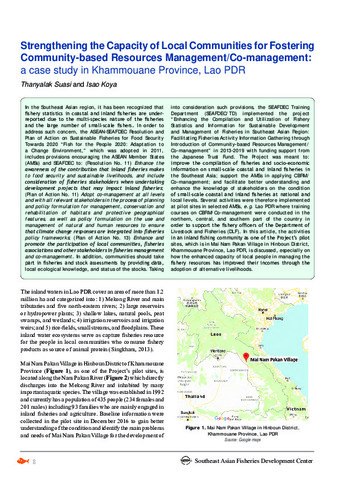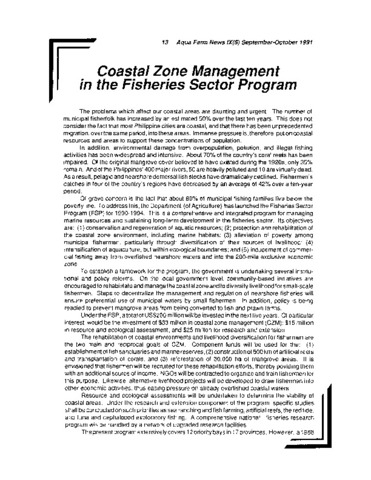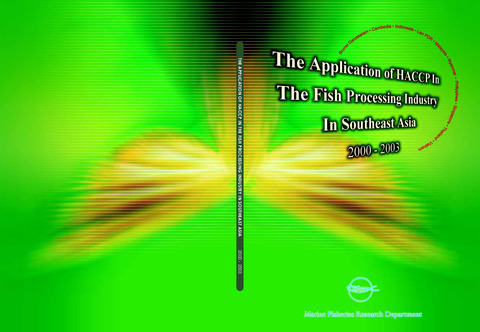Strengthening the capacity of local communities for fostering community-based resources management/co-management: a case study in Khammouane Province, Lao PDR
Share
Abstract
In the Southeast Asian region, it has been recognized that fishery statistics in coastal and inland fisheries are underreported due to the multi-species nature of the fisheries and the large number of small-scale fishers. In order to address such concern, the ASEAN-SEAFDEC Resolution and Plan of Action on Sustainable Fisheries for Food Security Towards 2020 “Fish for the People 2020: Adaptation to a Change Environment,” which was adopted in 2011, includes provisions encouraging the ASEAN Member States (AMSs) and SEAFDEC to: (Resolution No. 11) Enhance the awareness of the contribution that inland fisheries makes to food security and sustainable livelihoods, and include consideration of fisheries stakeholders when undertaking development projects that may impact inland fisheries; (Plan of Action No. 11) Adopt co-management at all levels and with all relevant stakeholders in the process of planning and policy formulation for management, conservation and rehabilitation of habitats and protective geographical features, as well as policy formulation on the use and management of natural and human resources to ensure that climate change responses are integrated into fisheries policy frameworks; (Plan of Action No. 13) Enhance and promote the participation of local communities, fisheries associations and other stakeholders in fisheries management and co-management. In addition, communities should take part in fisheries and stock assessments by providing data, local ecological knowledge, and status of the stocks. Taking into consideration such provisions, the SEAFDEC Training Department (SEAFDEC/TD) implemented the project “Enhancing the Compilation and Utilization of Fishery Statistics and Information for Sustainable Development and Management of Fisheries in Southeast Asian Region: Facilitating Fisheries Activity Information Gathering through Introduction of Community-based Resources Management/Co-management” in 2013-2019 with funding support from the Japanese Trust Fund. The Project was meant to: improve the compilation of fisheries and socio-economic information on small-scale coastal and inland fisheries in the Southeast Asia; support the AMSs in applying CBRM/Co-management; and facilitate better understanding and enhance the knowledge of stakeholders on the condition of small-scale coastal and inland fisheries at national and local levels. Several activities were therefore implemented at pilot sites in selected AMSs, e.g. Lao PDR where training courses on CBRM/Co-management were conducted in the northern, central, and southern part of the country in order to support the fishery officers of the Department of Livestock and Fisheries (DLF). In this article, the activities in an inland fishing community as one of the Project’s pilot sites, which is in Mai Nam Pakan Village in Hinboun District, Khammouane Province, Lao PDR, is discussed, especially on how the enhanced capacity of local people in managing the fishery resources has improved their incomes through the adoption of alternative livelihoods.
Suggested Citation
Suasi, T., & Koya, I. (2019). Strengthening the capacity of local communities for fostering community-based resources management/co-management: a case study in Khammouane Province, Lao PDR. Fish for the People , 17(3), 8-11. http://hdl.handle.net/20.500.12066/5800
Subject
Koleksi
Related items
Showing items related by title, author, creator and subject.
-
Proceedings of the Regional Seminar on Integrated Coastal Resources Management in Southeast Asia: Lessons Learned through Integrated Coastal Resources Management in Pathew District, Chumphon Province (ICRM-PD)
Training Department, Southeast Asian Fisheries Development Center (Training Department, Southeast Asian Fisheries Development Center, 2007-09)The proceedings contain the papers that were presented at a regional seminar on integrated coastal resources management. The seminar was conducted to 1) report the achievement and outcome of the project during its 5-year ... -
Coastal zone management in the fisheries sector program
Carreon-Lagoc, Julia; Southeast Asian Fisheries Development Center, Aquaculture Department (Aquaculture Department, Southeast Asian Fisheries Development Center, 1991) -
The application of HACCP in the fish processing industry in Southeast Asia, 2000-2003
Yeap, Soon Eong; Hariono, Ira; Southeast Asian Fisheries Development Center, Marine Fisheries Research Department (Marine Fisheries Research Department, Southeast Asian Fisheries Development Center, 2003)At the 31st SEAFDEC Council Meeting in March 1999, it was proposed that a Japanese Trust Fund Project financed by the Fisheries Agency of Japan be established to support the programmes under the ASEAN-SEAFDEC Fisheries ...





